Elijah Wald – Claude "Fiddler" Williams profile |
| Back
to the Books and Other Writing page Back to the Archive Contents page CLAUDE WILLIAMS REMEMBERS WHEN JAZZ FIDDLERS WERE SCARCE
While in recent years there has been a small boom in jazz violin playing, sparked by bluegrass offshoots and the Western swing revival, Williams can remember when hot fiddlers could be numbered on one hand. "Didn't nobody know nothing about violin except Stuff Smith, Ray Nance, and Eddie South," he says. Even Williams spent most of his big band career playing guitar, winning the Down Beat poll as "best guitarist" of 1936. "Actually, I started off playing banjo and violin," Williams remembers. ''That was a little before guitar days, you know. When guitar did come in I switched over, because my brother-in-law had taught me a little when I was playing in his string band in Tulsa. Then, when I left Count, I heard there was a lot of good guitar players around but violins have always been real scarce, so that's the reason I decided to concentrate on that." Williams says that his guitar playing had a major influence on his approach to violin. "My style is different from any of the other fiddle players in the United States or anywhere else. 'Cause other than trying to swing the melody and do little tricks and things I play chord progressions that I know on guitar: my diminished, augmented, flat fifth, all that stuff." Two new CDs from Arhoolie, Claude Williams Live at J's, vols. 1 and 2, show his range and power. The tunes are mostly standards, with a few Williams originals thrown in for good measure. The most unusual is "The Fiddler," a swing hoedown combining country and jazz. "A lot of people get a kick out of that," he says, laughing. "I can play all that natural hillbilly stuff, you know, because Bob Wills was in Tulsa, playing every day on the radio for his Playboy Flour Company." In a departure from his earlier work, the new albums also feature Williams as a singer. "Only singing I did before was with the Austin Powell quintet, where we all sang harmony," he says. "I never did threaten to sing the melody on nothing. I say I ain't got no voice, but people say it sounds good, it's something different." Indeed, his singing adds a gently soulful touch that nicely balances his hard-swinging fiddle work. Still, the fiddle remains his main love. "It's the hardest instrument in the world. That's the only reason I can think of why it's so rare in jazz. It's such a tough instrument, and it's never been mastered. But I'm going to keep at it as long as I keep my health and my fingers keep working, and as long as I can keep entertaining the people and they like my style." |
 This weekend, Williams will make four local appearances, Thursday through Saturday with the "American Jazz Violin Summit" and Sunday in a solo concert. The Summit, organized by Matt Glaser of the Berklee School of Music, features some of America's top jazz fiddlers. Thursday's special guest will be Joe Kennedy, a 70-plus-year-old Virginian, and all three nights will have Williams, Glaser, Darol Anger (of David Grisman's quintet and the Turtle Island String Quartet), and John Blake (of McCoy Tyner and Grover Washington's groups), along with mandolinist Paul Glass, guitarist Gray Sargent, and bassist Marshall Wood.
This weekend, Williams will make four local appearances, Thursday through Saturday with the "American Jazz Violin Summit" and Sunday in a solo concert. The Summit, organized by Matt Glaser of the Berklee School of Music, features some of America's top jazz fiddlers. Thursday's special guest will be Joe Kennedy, a 70-plus-year-old Virginian, and all three nights will have Williams, Glaser, Darol Anger (of David Grisman's quintet and the Turtle Island String Quartet), and John Blake (of McCoy Tyner and Grover Washington's groups), along with mandolinist Paul Glass, guitarist Gray Sargent, and bassist Marshall Wood.